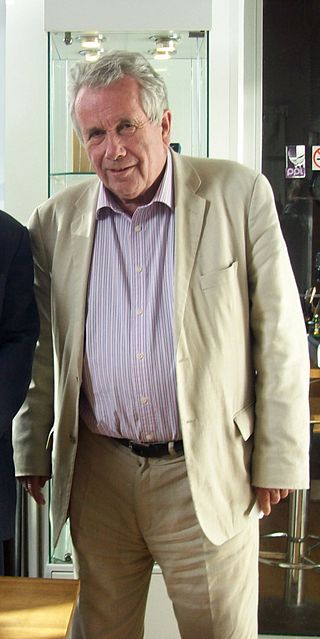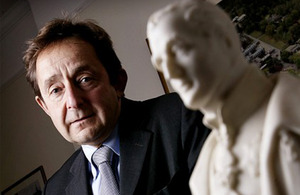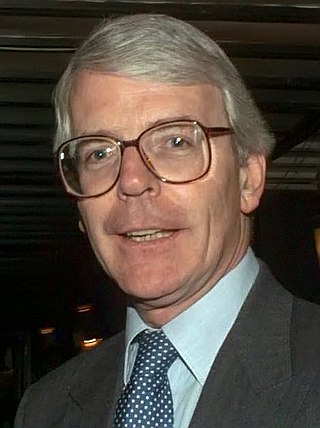Related Research Articles

Sir John Major is a British former politician who served as Prime Minister of the United Kingdom from November 1990 to May 1997 and Leader of the Conservative Party from November 1990 to June 1997. He previously held Cabinet positions under prime minister Margaret Thatcher, lastly as Chancellor of the Exchequer from 1989 to 1990. Major was the Member of Parliament (MP) for Huntingdon, formerly Huntingdonshire, from 1979 to 2001. Since stepping down as an MP in 2001, Major has focused on writing and his business, sporting and charity work, and has occasionally commented on political developments in the role of an elder statesman.

The 1997 United Kingdom general election was held on Thursday, 1 May 1997. The governing Conservative Party led by Prime Minister John Major was defeated in a landslide by the Labour Party led by Tony Blair, achieving a 179-seat majority.

Thatcherism is a form of British conservative ideology named after Conservative Party leader Margaret Thatcher that relates to not just her political platform and particular policies but also her personal character and general style of management while in office. Proponents of Thatcherism are referred to as Thatcherites. The term has been used to describe the principles of the British government under Thatcher from the 1979 general election to her resignation in 1990, but it also receives use in describing administrative efforts continuing into the Conservative governments under John Major and David Cameron throughout the 1990s and 2010s. In international terms, Thatcherites have been described as a part of the general socio-economic movement known as neoliberalism, with different countries besides the United Kingdom sharing similar policies around expansionary capitalism.

New Labour was a period in the history of the British Labour Party from the mid to late 1990s until 2010 under the leadership of Tony Blair and Gordon Brown. The name dates from a conference slogan first used by the party in 1994, later seen in a draft manifesto which was published in 1996 and titled New Labour, New Life for Britain. It was presented as the brand of a newly reformed party that had altered Clause IV and endorsed market economics. The branding was extensively used while the party was in government between 1997 and 2010. New Labour was influenced by the political thinking of Anthony Crosland and the leadership of Blair and Brown as well as Peter Mandelson and Alastair Campbell's media campaigning. The political philosophy of New Labour was influenced by the party's development of Anthony Giddens' Third Way which attempted to provide a synthesis between capitalism and socialism. The party emphasised the importance of social justice, rather than equality, emphasising the need for equality of opportunity and believed in the use of markets to deliver economic efficiency and social justice.

Martin Bell, is a British UNICEF Ambassador, a former broadcast war reporter and former independent politician who became the Member of Parliament (MP) for Tatton from 1997 to 2001. He is sometimes known as "the man in the white suit".

In British politics, Blairism is the political ideology of Tony Blair, the former leader of the Labour Party and Prime Minister between 1997 and 2007, and those that support him, known as Blairites. It entered the New Penguin English Dictionary in 2000. Elements of the ideology include investment in public services, expansionary efforts in education to encourage social mobility, and increased actions in terms of mass surveillance alongside a ramping up of law enforcement powers, both of these latter changes advocated in the context of fighting organized crime and terrorism. Blairites have additionally been known for their contrast with the traditional support for socialism by those believing in left-wing politics, with Blair himself and others speaking out against the nationalisation of major industries and against also heavy regulations of business operations.

Shaun Anthony Woodward is a British politician.

Sir Peter Hannay Bailey Tapsell was a British Conservative Party politician and Member of Parliament (MP) for Louth and Horncastle. He served in the House of Commons continuously from 1966 until 2015, and was also previously an MP from 1959 to 1964. He was Father of the House between 2010 and 2015.

John Birt, Baron Birt is a British television executive and businessman. He is a former Director-General (1992–2000) of the BBC.

The Primrose League was an organisation for spreading Conservative principles in Great Britain. It was founded in 1883.

Arthur Seldon, was joint founder president, with Ralph Harris, of the Institute of Economic Affairs, where he directed editorial affairs and publishing for more than thirty years. He is the father of political author Anthony Seldon.
Peter Alan Oborne is a British journalist and broadcaster. He is the former chief political commentator of The Daily Telegraph, from which he resigned in early 2015. He is author of The Rise of Political Lying, The Triumph of the Political Class, and The Assault on Truth: Boris Johnson, Donald Trump and the Emergence of a New Moral Barbarism, and along with Frances Weaver of the pamphlet Guilty Men. He has also authored a number of books about cricket. He writes a political column for Middle East Eye and a diary column for the Byline Times.

Back to Basics was a political campaign announced by British Prime Minister John Major at the Conservative Party conference of 1993 in Blackpool.

Iain Campbell Dale is a British broadcaster, author and political commentator, and a former publisher and book retailer. He has been a blogger since 2002. In 2005, he became the first openly gay Conservative candidate to contest a parliamentary election. He was the publisher of the Total Politics magazine between 2008 and 2012, and the managing director of Biteback Publishing until May 2018. Since September 2010, he has hosted a regular discussion show on the radio station LBC. He was named Radio Presenter of the Year at the Arqiva Commercial Radio Awards in both 2013 and 2016.

Sir Anthony Francis Seldon is a British educator and contemporary historian. As an author, he is known in part for his political biographies of consecutive British Prime Ministers, Margaret Thatcher, John Major, Tony Blair, Gordon Brown, David Cameron, Theresa May and Boris Johnson. He was the 13th Master (headmaster) of Wellington College, one of Britain's co-educational independent boarding schools. He was Vice-Chancellor of the University of Buckingham from 2015 to 2020, when he was succeeded by James Tooley. In 2009, he set up The Wellington Academy, the first state school to carry the name of its founding independent school. Before that, he was head of Brighton College.

Sir Ivor Martin Crewe DL FAcSS was until 2020 the Master of University College, Oxford, and President of the Academy of Social Sciences. He was previously Vice-Chancellor of the University of Essex and also a Professor in the Department of Government at Essex.

Tony Blair's term as the prime minister of the United Kingdom began on 2 May 1997 when he accepted an invitation of Queen Elizabeth II to form a government, succeeding John Major of the Conservative Party, and ended on 27 June 2007 upon his resignation. While serving as prime minister, Blair also served as the first lord of the treasury, minister for the civil service and leader of the Labour Party. Blair, as Labour Party Leader, focused on moving his party to the right to a more centrist policy platform, entitled 'New Labour'. That involved promises of devolution referendums for Scotland and Wales, heightened fiscal responsibility, and a decision to nominate more female politicians for election through the use of all-women shortlists from which to choose candidates.

Prof Alan George Smithers is an English educationalist.

John Major's term as the Prime Minister of the United Kingdom began on 28 November 1990 when he accepted an invitation of Queen Elizabeth II to form a government, succeeding Margaret Thatcher, and ended on 2 May 1997 following the Conservative Party's defeat in the 1997 general election by the Labour Party, led by Tony Blair. While serving as prime minister, Major also served as the First Lord of the Treasury, the Minister for the Civil Service and the Leader of the Conservative Party.
Conor Ryan is an Irish-born UK-based senior civil servant, independent writer and consultant, journalist, and adviser who is Director of External Relations at the Office for Students, a non-departmental public body of the British Department for Education. He served as a special adviser and the senior education adviser to British Secretary of State for Education and Employment David Blunkett from 1997 to 2001 and then to British Prime Minister Tony Blair from 2005 to 2007.
References
- ↑ Jenkins, Simon (4 November 2007). "Blair Unbound by Anthony Seldon with Peter Snowdon". The Times. London. Retrieved 22 May 2010.